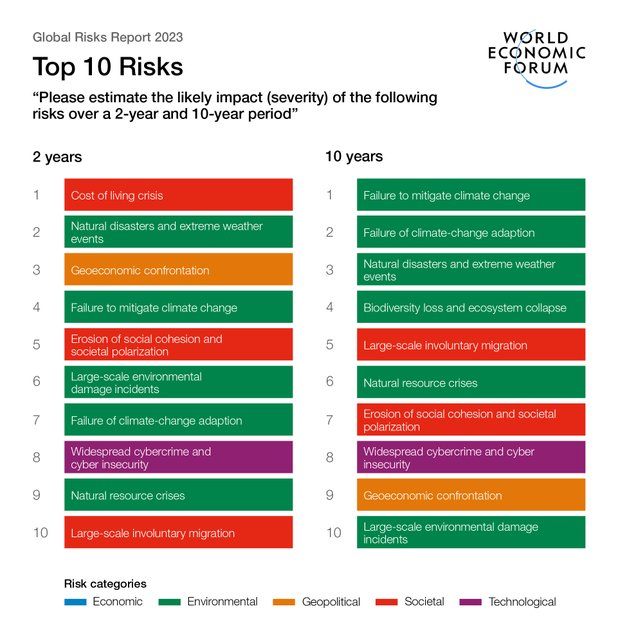Global Risks Report 2023 | 16 Jan 2023
Prelims: World Economic Forum, Davos Summit, Climate Change, Climate Action and Biodiversity Loss.
Mains: Global Risks Report 2023.
Why in News?
Recently, the World Economic Forum (WEF) has released the 18th Edition of Global Risks Report 2023 which seeks that the world be prepared for ‘Natural disasters and extreme weather events’ in the next two years.
- The WEF report has been released ahead of its flagship Davos 2023 Meeting, which is titled as Cooperation in a Fragmented World.
What are the Findings of the Report?
- Most Severe Risks:
- ‘Failure to Mitigate Climate Change’ and ‘Failure of Climate Change Adaptation’ are the two most severe risks facing the world in the next decade, followed by ‘natural disasters and extreme weather events’ and ‘Biodiversity loss and ecosystem collapse’.
- Today, atmospheric levels of carbon dioxide, methane and nitrous oxide have all reached record highs.
- Emission trajectories make it very unlikely that global ambitions to limit warming to 1.5°C will be achieved.
- Climate Action and Biodiversity Loss:
- The world has struggled to make the required progress on climate change despite 30 years of global climate advocacy and diplomacy.
- Failure on climate action to address climate change’ has continued to figure among the top risks in the report since 2011.
- Biodiversity within and between ecosystems is already declining faster than at any other point during human history.
- But unlike other climate-related risks, ‘Biodiversity loss and ecosystem collapse’ has not been perceived to be of concern over the short term.
- It has been ranked as the 4th most severe risk in the long term or over the next ten years (by 2033).
- Reversal of Climate Mitigation Progress:
- Growing demands on public- and private-sector resources from the socio-economic short-term crises attributed to geopolitical tensions, will likely reduce the speed and scale of mitigation efforts over the next two years.
- These have, in some cases, also reversed progress on climate change mitigation, at least over the short term.
- For example, the European Union spent at least 50 billion euros on new and expanded fossil-fuel infrastructure and supplies.
- Some countries including Austria, Italy, the Netherlands and France restarted coal power stations.
- Apprehensions and Threats:
- Over the next 10 years or by 2033, the interconnections between biodiversity loss, pollution, natural resource consumption, climate change and socioeconomic drivers will make for a dangerous mix.
- In the meantime, the current global pandemic and war in Europe has been held responsible for the energy, inflation and food crises. In fact, ‘cost of living’ ranks as the top most serious global risk in the short term (over the next two years).
- Failure to mitigate climate change is also a significant global risk that the world is least prepared for.
- 70% of the respondents in the WEF report said existing measures to prevent or prepare for climate change have been “ineffective” or “highly ineffective”.
What is Global Risk?
- Global risk is defined as the possibility of the occurrence of an event or condition which, if it occurs, would negatively impact a significant proportion of global gross domestic product, population or natural resources.
- The Global Risks Report is an annual study published by the World Economic Forum ahead of the Forum’s Annual Meeting in Davos, Switzerland. Based on the work of the Global Risk Network, the report describes changes occurring in the global risks landscape from year to year.
What is the World Economic Forum?
- About:
- The WEF is a Swiss nonprofit foundation established in 1971, based in Geneva, Switzerland.
- Recognized by the Swiss authorities as the international institution for public-private cooperation.
- Mission:
- Committed to improving the state of the world by engaging business, political, academic, and other leaders of society to shape global, regional, and industry agendas.
- Founder and Executive Chairman: Klaus Schwab.
- Some major reports published by WEF are:
- Energy Transition Index.
- Global Competitiveness Report.
- Global IT Report
- WEF along with INSEAD, and Cornell University publishes this report.
- Global Gender Gap Report.
- Global Travel and Tourism Report.
UPSC Civil Services Examination, Previous Year Questions (PYQs)
Q1. Which of the following gives ‘Global Gender Gap Index’ ranking to the countries of the world? (2017)
(a) World Economic Forum
(b) UN Human Rights Council
(c) UN Women
(d) World Health Organization
Ans: (a)
Q2. Who among the following is the founder of World Economic Forum? (2009)
(a) Klaus Schwab
(b) John Kenneth Galbraith
(c) Hobert Zoellick
(d) Paul Krugman
Ans (a)
Q3. The Global Competitiveness Report is published by the (2019)
(a) International Monetary Fund
(b) United Nations Conference on Trade and Development
(c) World Economic Forum
(d) World Bank
Ans: (c)

